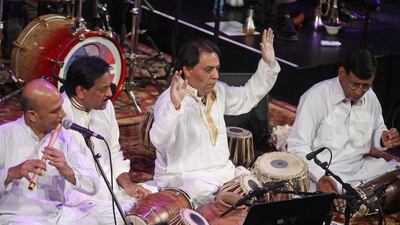July 5, 1977. Pakistan’s General Muhammad Zia Ul-Haq appears on national television to announce that “the government of Mr [Zulfikar Ali] Bhutto has ceased to exist”. The 11 years of military dictatorship that followed – with its emphasis on the “Sharisation” of Pakistan – dealt a massive blow to the country’s culture industry.
Music was declared sinful. The film industry which employed many of the country’s classical musicians collapsed amid a flurry of bans. Many of Pakistan’s great musicians gave up their instruments for work as drivers or tea-sellers. The ones that persevered struggled with poverty and prejudice.
"Musicians here are seen as belonging to a lower caste," declares flautist Baqar Abbas in Song of Lahore, Sharmeen Obaid-Chinoy and Andy Schocken's engaging new documentary that was released online and had a limited general release last month.
The film follows seven classical musicians in Lahore who come together to perform and record at Sachal Studios, founded by Izzat Majeed in 2004 to reclaim this forgotten part of the country’s cultural heritage. The early scenes outline Lahore’s musical history, with anecdotes of the pre-1977 heyday illustrated by a wealth of archival photos.
The opening half is sombre and melancholic, as the musicians give testimony about the Zia years and the struggles they continue to face, including Taliban repression. The filmmakers craft intimate portraits of each artist, taking us into their homes and mapping out the transfer of musical knowledge from one generation to another.
Their musical lineage is a source of both inspiration and heavy responsibility for many. Arranger and conductor Nijat Ali is trying to fill the massive boots of his father Riaz Hussain, who passed away while the documentary was being shot, and occasionally grapples with self-doubt.
Elsewhere, violinist Saleem Khan is driven to tears by his son’s lack of interest in practising his instrument, who also looks like he doesn’t know how to respond.
The political background to the censorship of music is also covered, if obliquely. Abbas reflects sadly on the massacre of a busload of Shias, and the news that a guitarist friend has been shot dead by militants. In another scene, the musicians discuss the consequences of extremism.
“There used to be so much life here, now everyone’s scared to come out,” one says.
The Sachal Ensemble released a few classical and folk albums but got no response. Then Majeed hit upon the idea of getting the musicians to interpret jazz standards through a classical lens, in an attempt to gain a global audience.
The group's reworking of Dave Brubeck's Take Five was a breakthrough record, getting them featured on the BBC and an invitation to perform at New York's Lincoln Center for the Performing Arts with trumpet legend Wynton Marsalis and a jazz orchestra.
This is where the film picks up pace, as the musicians wrestle with excitement and anxiety. The rehearsal scenes are taut with tension, the Pakistani musicians intimidated by Marsalis’s big band. The group’s sitar player can’t rise to the occasion, so he has to be replaced at the last minute by a New York-based sitarist.
The whole enterprise teeters on the verge of collapse. These scenes are intercut with charming interludes of the ensemble walking through Times Square and jamming with the infamous “Naked Cowboy”. When they come across a busker playing paint cans repurposed as drums, one of them laughs, saying “He’s a poor musician just like us.”
In the end, of course, they pull it off. The one song that is shown here in full is so wonderful that you wish you could see the whole performance. Both sets of musicians laugh and nod at each other on stage, delighted with what they’ve managed to accomplish.
The documentary ends with the group back home, elated to finally have achieved some recognition, and preparing to perform in Lahore for the first time. It’s a fittingly optimistic end to a film that is as much about the power of hope as it is about music.
Bhanuj Kappal is a freelance journalist based in Mumbai who writes about music, protest culture and politics.

